- Home
- Jim Eldridge
Murder at the Manchester Museum Page 2
Murder at the Manchester Museum Read online
Page 2
‘That would have taken a lot of strength,’ said Daniel. ‘There were no witnesses?’
Steggles shook his head. ‘She was in an isolated corner of the reading room. She was found lying face down on the table, with blood by her.’
‘You say she was doing some research,’ said Abigail. ‘Was she a student of some sort?’
‘No,’ said Steggles. ‘In fact, she seemed to have been someone from a poor background, to judge by her clothes. Her clothes were clean, but very worn and repaired many times. Indeed, her shoes had holes in the soles and newspapers had been put inside to give protection against cobbles.’
‘Do you know her name?’
Again, Steggles shook his head.
‘No. She gave no name, and there was no form of identification on her. She did have a bag with her, but that had gone. I assume whoever stabbed her took it.’
‘A robbery?’ hazarded Abigail.
‘Unlikely,’ said Daniel thoughtfully. ‘Whoever did it was obviously strong. If they simply wanted the bag all they had to do was take it from her. At worst, a punch to knock her out if she resisted. What do the police say?’
‘To be honest, that’s why we’ve asked you if you’d look into it. As far as the police are concerned, there is no case to investigate. A woman no one knows has died. There were no witnesses, so no sighting of a suspect. Her obvious poverty means to them she is of no importance. They say they haven’t the resources to waste investigating something that can’t be solved.’
‘That’s very harsh,’ said Daniel.
‘That’s what we thought. The board of the museum, that is. Although there’s been a museum in Manchester since 1821, this building was only opened seven years ago. It is our ambition to provide the resources for education not just for students and staff of the university, but for the wider public. Especially those from poor and deprived backgrounds. We are an establishment with a social conscience, as are many others in Manchester. We feel that the violent death of someone should not be ignored simply because they are poor or are not recognised as important to society. If the police won’t agree to look into this poor woman’s death, then we feel it is up to us to do something.’
A gentle knock at the door interrupted them.
‘Ah, that will be the tea,’ said Steggles.
He got up and walked briskly to the door, opening it to admit a kindly looking woman of middle age carrying a tray on which were cups and saucers and all the other accoutrements for tea, including a plate of mixed biscuits.
‘On the desk, please, Mrs Wedburn.’ Steggles smiled.
Once Mrs Wedburn had deposited the tray and departed, Steggles busied himself with pouring the tea to their specifications – milk for both, sugar for Daniel but not for Abigail – and served them, placing the biscuits within easy reach.
‘You said there was a second murder,’ said Abigail.
Steggles nodded. ‘That was only discovered this morning. There’d been reports of a foul smell inside the cellar. This morning Walter Arkwright, one of our attendants who also acts as our storeman, traced it to behind some packing cases. The body of a woman was there.’ He gave a shudder as he said, ‘Someone had sliced her face off.’
Abigail and Daniel stared at him, shocked.
‘How?’ asked Daniel. ‘What with?’
‘The police just said it must have been with a large, sharp blade. Someone had sliced off the front of her face, right back to the bones of her skull.’
‘Where is the body now?’
‘At the hospital mortuary, along with the body of the young woman.’
Daniel and Abigail were silent for a moment as they took all this in, then Daniel said, ‘Surely there are private enquiry agents here in Manchester, Mr Steggles. I say this because Miss Fenton and I are unfamiliar with the city. A local enquiry agent would have easier access to sources of information and local contacts.’
‘True,’ said Steggles. ‘But we have been following the successes the pair of you have had when murders have occurred at other museums. The Fitzwilliam in Cambridge, the British Museum, the Ashmolean in Oxford. On every occasion you succeeded when the local police force had failed.’
‘I wouldn’t say “failed”,’ said Daniel carefully. ‘On those occasions we worked with the local police force and were able to bring a different eye to the investigation. I have a policeman’s experience, but Miss Fenton is the one who is at home in a museum setting, and her instincts proved invaluable in those cases.’
‘Yes, we are very aware of Miss Fenton’s reputation,’ said Steggles. ‘I have read your articles concerning your excavations at Giza, and your recent work on Hadrian’s Wall. And we have some artefacts here from your own work at Hawara. We are privileged to have you here with us. I would deem it an honour for you to spend some time exploring the museum and letting us have your comments and recommendations.’
‘With the greatest respect, Mr Steggles, I feel that sometimes my reputation as an archaeologist has become somewhat inflated, possibly due to the rather purple prose of the popular newspapers.’
‘I am basing my opinion on reports on you and your work from other archaeologists and curators, Miss Fenton. Your peers hold you in high esteem.’
Abigail coloured, and Daniel had to hide a smile at the idea of Abigail blushing.
‘Thank you, Mr Steggles. But, as far as conducting investigations, Mr Wilson gives me too much credit. The truth is, we complement one another and so bring different observations to cases.’
‘As we hope you will to this.’
‘But those other cases were connected to the museums,’ stressed Daniel. ‘We’re not sure if that’s the case here. We have to look at the possibility that these women may have been killed for reasons that have nothing to do with the museum.’
‘In which case, that will be a relief to us. The idea that in some way the museum may have been the cause of their deaths hangs heavy on us.’ He gestured at the plate. ‘Biscuit?’ he offered. He selected one himself and looked at it in a guilty fashion. ‘My wife says I eat too many of these and they’re bad for my health, but with the stress we’ve been under lately over this murder, it’s a relief to have some kind of solace.’
CHAPTER THREE
Replenished by tea and an occasional biscuit, Daniel suggested going to the reading room to examine the site of the murder, and then the cellar where the most recent body had been discovered.
‘Yes, I was just going to suggest that,’ said Steggles. ‘It will give you a chance to meet Jonty Hawkins. He’s the librarian in charge of the reading room, and it was he who discovered the first body.’
‘In that case we definitely need to make his acquaintance,’ said Daniel.
Steggles led the way to the reading room, this time their route taking them through the actual museum.
‘Hawkins is a remarkable young man. Many young men would have been too disturbed by the awful discovery he made to have been able to continue to work, but he absolutely refused my suggestion he go home. A fine young man. He’s also quite an accomplished poet. His work has appeared in magazines here in Manchester.’
They entered the reading room and Steggles led the way to the desk at which a young man was sitting, examining a book. He stood up as they approached, and Daniel and Abigail exchanged glances that meant they were both thinking the same: Jonty Hawkins was in his twenties, and his style of dress and manner was as far removed from the bank clerk appearance of Steggles as was possible. He was tall and thin and wore a long, green velvet jacket over a flowered waistcoat, but it was his long hair that caught their attention, curling luxuriantly over his ears and collar in the style of Oscar Wilde’s most ardent followers. There was even a hint of rouge on his otherwise pale face.
‘Mr Hawkins, these are Mr Daniel Wilson and Miss Abigail Fenton, the people from London I spoke about.’
Hawkins gave them a smile and held out his hand to shake theirs in greeting.
‘Welcome,’ he said. ‘I know
of your reputations, of course. Yours in particular, Miss Fenton. Your work at Giza is an inspiration to all.’
‘You are interested in archaeology?’ asked Abigail.
‘Fervently,’ said Hawkins earnestly. ‘You must allow me to show you the pieces we have from Kahun and Hawara.’
‘Flinders Petrie,’ murmured Abigail.
‘You were with Petrie at Hawara, I believe,’ said Hawkins excitedly.
Abigail nodded. ‘I was.’
‘For the moment I’ve brought Mr Wilson and Miss Fenton here to talk to you about … what happened here last Thursday,’ interrupted Steggles, lowering his voice almost to a whisper.
‘Of course.’ Hawkins nodded. ‘My apologies.’
Steggles turned to Daniel and Abigail.
‘I’ll leave you with Mr Hawkins. When you’ve finished with him perhaps you’d return to my office and I can give you directions to your hotel and details of the booking. Or, if I’m not available for any reason, my secretary, Mrs Wedburn, will be able to supply the information.’
Daniel and Abigail thanked him, and then turned back to Jonty Hawkins.
‘Perhaps it would be better if we moved outside,’ suggested Hawkins. ‘We can talk freely there.’ He gestured at the room, where already some of the people sitting at the various tables were glaring at them disapprovingly. ‘It is a reading room, after all, and people expect a quiet atmosphere.’
Daniel and Abigail nodded in acquiescence and followed the young man out of the reading room into the corridor outside.
‘We can talk here, but it’s still better if we keep our voices low.’
‘Of course,’ said Abigail. ‘Mr Steggles said it was you who found the body.’
‘Yes, and no,’ said Hawkins. ‘A man came to my desk and said there was a woman slumped over the table. To be honest, that’s not unusual. We get many people coming in here to seek shelter, and some of them fall asleep. It’s not something we encourage, but we don’t like to throw them out. Times are hard. But this man said he thought he saw blood on the table.’ He hesitated, then added, ‘It would make more sense if I show you where she was found, and you can see the arrangements for readers.’
‘Excellent idea,’ said Daniel. ‘But before we do that, as we can talk here, it would be useful to learn what you knew about her?’
‘Knew?’ said Hawkins. He gave a rueful sigh. ‘Very little, I’m afraid. She appeared on Wednesday last week and asked me if we had anything about the Manchester army from a long time ago. I told her that the army records are kept at the barracks. Much of what we have are newspaper reports about different campaigns. She said she’d been to the barracks but they hadn’t been able to help her. I said the barracks was still her best choice, but she said she couldn’t go back there. I got the impression they’d turned her away quite harshly.’
‘She asked about the Manchester army?’ said Daniel. ‘Not a particular regiment?’
‘No,’ said Hawkins. ‘She said she was looking for information about the army from about eighty years ago.’
‘Eighty years,’ said Daniel thoughtfully. ‘1815. That would be during the Battle of Waterloo.’
‘Yes, but there was no actual Manchester army at that time, just other regiments that later formed it. The Manchester Regiment was created in 1881 with the amalgamation of the 63rd West Suffolk, the 96th Regiment of Foot, the 6th Royal Lancashire Militia and some volunteer battalions.’
‘You are a keen student of military history?’ asked Daniel, impressed.
‘Not really,’ admitted Hawkins. ‘I only found this information when I made enquiries about the Manchester Regiment, after the young lady asked me. And I’ve been helping Mr Steggles with some background work on the exhibition about the Manchester regiments he’s planning.’
‘Were these other regiments at Waterloo?’ asked Daniel.
‘No, but the 15th Hussars based at Hulme were, although I don’t think they can be described as purely a Manchester regiment.’
‘Did she find what she wanted in the documents you provided?’
‘I assume not, because she came back the next day and asked if I had any different papers about the old regiments. I asked her what she was actually looking for, but she said she’d know it if she saw it.’ His face looked troubled as he added, ‘It was during that second visit, last Thursday, that she was killed.’ He gestured towards the reading room. ‘Perhaps now would be a good time to show you where she was.’
Daniel and Abigail followed Hawkins back into the reading room, past long rows of floor-to-ceiling bookshelves, before coming to four long tables. Each table was divided by wooden partitions into six small compartments.
‘The official reason for putting the partitions on the tables in this way was so that each person has privacy for their research,’ explained Hawkins as they approached the tables.
‘And the unofficial reason?’ asked Abigail.
Hawkins gave a rueful smile.
‘Before we put the partitions in place, some people would spread their books and papers so far out they’d take up the whole table, which led unfortunately to strong arguments. This way, readers can only have what they can fit into their compartment.’
There were a handful of people at the tables, some with newspapers, some with books, some scribbling notes, others just reading. Hawkins led the way to the furthest of the tables. Two men were sitting in the compartments, both intent on their work. One, a bearded man, looked up as Hawkins, Daniel and Abigail arrived, then he turned back to the pile of books he’d assembled.
Hawkins stopped by an empty compartment at the end of the table.
‘She was here,’ he said. ‘There was no one else at any of the tables. She was slumped across the table. I tapped her on the shoulder, then – when she didn’t respond – very gently raised her to sit up so I could see how she was, and then I saw the blood staining the front of her blouse and that it had run down.’
‘That must have been a dreadful experience for you,’ said Daniel sympathetically.
‘Awful,’ said the young man. ‘I’ve seen dead people before – you’d be surprised how many come in here for warmth and then die – but not like this. The police said she’d been stabbed in the back and the knife had gone deep into her heart and out through her ribs at the front.’ He shook his head. ‘It makes me sick just to think of it.’
‘What else did the police say?’ asked Daniel.
‘Not much,’ said Hawkins. ‘In fact, they didn’t seem unduly concerned. The inspector in charge said he didn’t think it worth investigating as no one knew who she was. I think that was because she was dressed in shabby clothes and obviously poor. And when I told him she was Irish …’
‘Irish?’
Hawkins nodded. ‘There are a lot of Irish in Manchester. The inspector said he expected it was some boyfriend she’d upset. When I told him that the bag she’d brought with her had gone, he said that was the answer: it was a robbery.’
‘Yes, Mr Steggles told us the police said they wouldn’t be investigating. Did you get this inspector’s name?’
‘Inspector Grimley.’
‘Where can we find him?’
‘He’s based at Newton Street police station. It’s not far from London Road railway station.’ He hesitated, then added warily, ‘He didn’t seem the most compassionate of people. But perhaps he’ll be different with you, Mr Wilson, you being an ex-Scotland Yard detective.’
‘What about where the most recent body was found? The one this morning.’
‘The cellar,’ said Hawkins. ‘I wasn’t involved in that. I only heard about it afterwards.’
‘We understand the body was found by Mr Walter Arkwright. Is he still here?’
‘He is. If you come this way, I’ll take you to him.’
They followed Hawkins downstairs to the reception area, where an elderly man in the blue uniform of a museum attendant stood to attention, back ramrod straight, hands behind his back, as he surveyed the people c
oming and going.
‘Mr Arkwright,’ said Hawkins. ‘These are Mr Daniel Wilson and Miss Abigail Fenton.’
Arkwright nodded. ‘Yes. Welcome. Mr Steggles told me you’d be coming.’
‘We understand you found the body in the cellar this morning.’
‘I did, sir,’ said Arkwright crisply. ‘I assume you wish to see where I found it?’
‘Yes, please.’
‘I’ll leave you in Mr Arkwright’s care,’ said Hawkins. ‘If you wish to talk to me again, you’ll find me in the reading room.’
Daniel and Abigail followed the elderly attendant through a door, then down some stone steps, a musty smell coming to them as they descended deeper.
‘Damp,’ observed Arkwright. ‘You’ll always get that in cellars. Luckily this place has been well-built so at least you don’t have rats getting in.’
At the bottom they came to a large room with a floor of flagstones, other rooms going off it. Each room was stacked with wooden packing cases, some large, some small.
‘Pieces awaiting exhibition,’ Arkwright informed them. ‘Every so often the displays are changed to keep people coming. Not every one, though. Some are always kept as they are because they’re so popular that people keep coming back to see them. Like the remains of the dodo, for example. Now that’s a rarity.’
He took them to where a stack of smaller wooden crates was piled one of top of the other in one of the inner rooms.
‘This is where I found her,’ he said. ‘I came down as I always do when I come in, and I knew that smell straight away. The smell of death. An old soldier, see. At first I thought it might have been something like a cat had got in and died, but the nearer I got to these crates, the stronger the smell of blood. I pulled the crates out, and there she was. She’d just been stuffed behind them and the crates pushed back.’ He shook his head. ‘It were a mess. Someone had bashed her head in, then sliced her face clean off, right back to the bone. All the skin and flesh gone.’

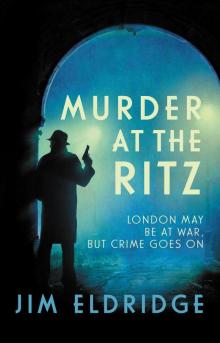 Murder at the Ritz
Murder at the Ritz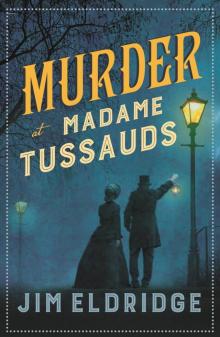 Murder at Madame Tussauds
Murder at Madame Tussauds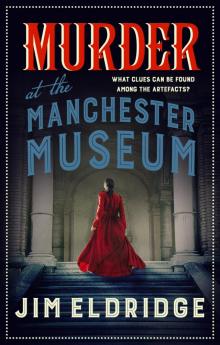 Murder at the Manchester Museum
Murder at the Manchester Museum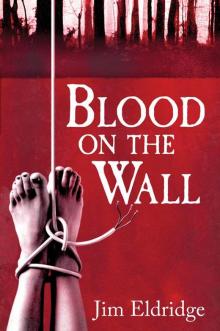 Blood On the Wall
Blood On the Wall 4.3.2.1
4.3.2.1 Jungle Kill (Black Ops)
Jungle Kill (Black Ops)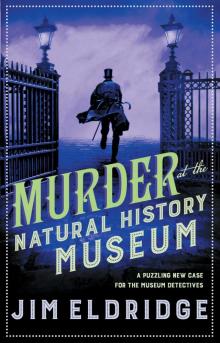 Murder at the Natural History Museum
Murder at the Natural History Museum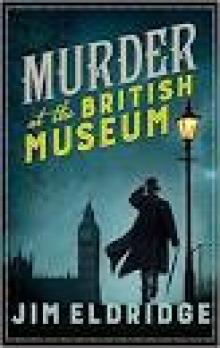 Murder at the British Museum
Murder at the British Museum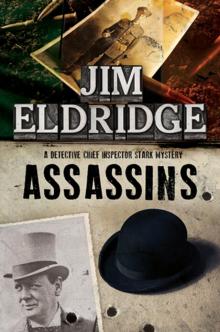 Assassins
Assassins Hunk and Thud
Hunk and Thud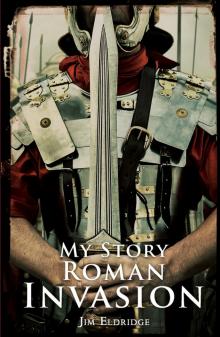 Roman Invasion
Roman Invasion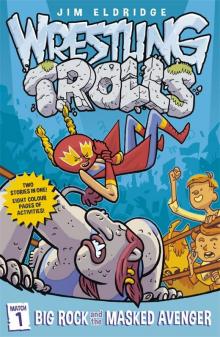 Big Rock and the Masked Avenger
Big Rock and the Masked Avenger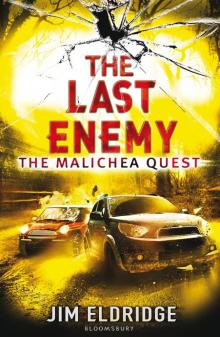 The Last Enemy
The Last Enemy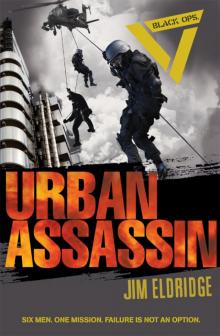 Urban Assassin
Urban Assassin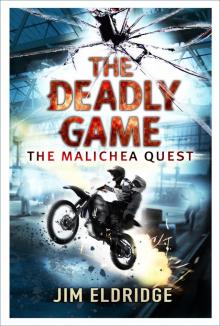 The Deadly Game
The Deadly Game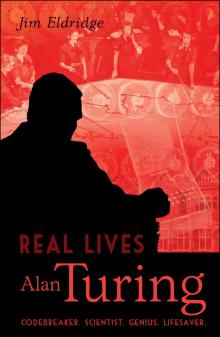 Alan Turing
Alan Turing The Lethal Target
The Lethal Target The Giant Rumble
The Giant Rumble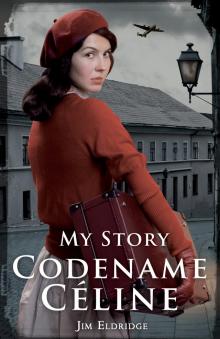 Codename Céline
Codename Céline Death in the Desert
Death in the Desert Escape from Pompeii
Escape from Pompeii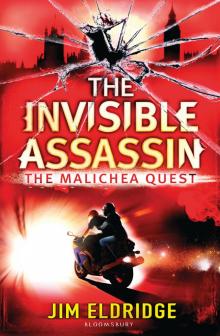 The Invisible Assassin
The Invisible Assassin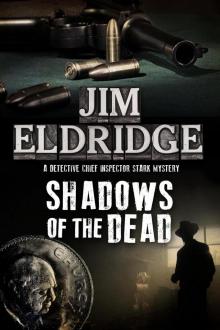 Shadows of the Dead
Shadows of the Dead Jack Versus Veto
Jack Versus Veto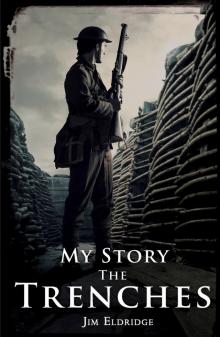 The Trenches
The Trenches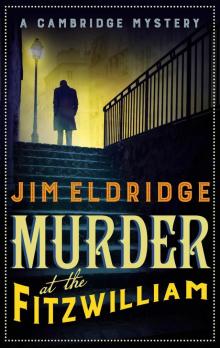 Murder at the Fitzwilliam
Murder at the Fitzwilliam Coming Home
Coming Home